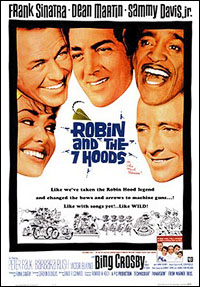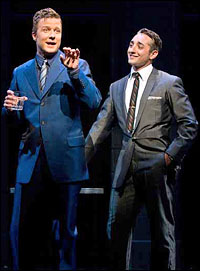
*
Robin and the 7 Hoods is the latest musical from the Renaissance-man writer who is a novelist ("Swing," "Where the Truth Lies"); librettist and contributing lyricist for Broadway's Curtains; playwright of Accomplice and Best Play Tony nominee Say Goodnight, Gracie; and creator of TV's "Remember WENN." Need we mention his pop hit "The Pina Colada Song" (also known as "Escape")? (For the record, our favorite Holmes song is "Answering Machine." Google it.)
In recent weeks, Holmes has been at The Old Globe in San Diego, CA, working on refinements to the extended (to Aug. 29) run of Robin and the 7 Hoods, a show inspired by the 1964 Frank Sinatra/Rat Pack film of the same name. ("My Kind of Town" was a hit from the mostly non-musical picture.)
Casey Nicholaw (The Drowsy Chaperone) directs and choreographs. For the stage, the score has been expanded to include songs from the catalog of lyricist Sammy Cahn and composer Jimmy Van Heusen. We caught up with Holmes between rewrites.
I have a confession. I have never seen the movie "Robin and the 7 Hoods." But I do know (obviously) that it was a vehicle for Frank Sinatra, Dean Martin, Sammy Davis Jr., and that it was a Chicago-set Prohibition-era gangster comedy. How intimate with the movie were you?
Rupert Holmes: I saw the movie at the Skouras Rockland Theatre in Nyack, NY, when I was in junior high, in that time when Frank, Dean and Sammy were still officially the coolest guys in the universe, and were not yet forced to share that title with John, Paul and George. What was the mandate when you took this job: Were you expected to honor the film completely, or to honor its spirit?
RH: The mandate was to create a musical that celebrated not only the spirit, swagger and soulfulness of the "Robin" songwriting team (Sammy Cahn and Jimmy Van Heusen) but also the period in which they were the unofficial poet laureates for Sinatra. With Casey [Nicholaw] in the driver's seat, we knew it should be a big-song-and-dance story centered around the kinds of characters Frank, Dean and their crew might easily have portrayed in the late '50s and early '60s.
 |
||
| Poster art for the film version of "Robin and the 7 Hoods" |
Honestly, no. The movie was set in the Prohibition era, its minimal plot centering around rival speakeasies. Frank looked as out of place in his Roaring Twenties suits as he had portraying a cowboy in "Johnny Concho."
The film of "Robin" had no romantic ballad for either Dean or Frank, no love interest to speak of, and a strange, downbeat ending that left its characters (and audience) in a glum final fade. I think the movie is remembered most fondly by those who only saw its trailer. For the rest of us who sat through it with great expectations, it seemed a disappointing farewell to the Rat Pack movies.
On the other hand, our producers acquired the right for Casey and me to pick from the entire Cahn and Van Heusen song catalog, which means our score is rich with songs that catapult the audience into the early, scintillating '60s: "Ring-a-Ding-Ding," "Ain't That a Kick in the Head," "The Tender Trap," "All the Way," "Call Me Irresponsible." None of these titles evoke the Prohibition era, of course, and once we eliminated speakeasies, flappers, and temperance rallies, there wasn't much left of the movie's story. So from the outset, we knew we would have to invent a new plot line more compatible with our score, using Cahn and Van Heusen's classic tunes as touchstones for our tale.
You are known for shows that are filled with passionate characters, from Drood to Curtains. What makes Robin and the 7 Hoods a Rupert Holmes show?
RH: I've always been a total mark for any story about an otherwise invulnerable rogue who takes a great fall, all for the love of a good woman. I made the unprincipled Scott Sherwood's rocky romance with the ethical Betty Roberts a centerpiece of my AMC series "Remember WENN." With Robin, we go a step further when an out-and-out hood named Robbo crosses paths with a crime-fighting female journalist.
Additionally, one characteristic of my work as a librettist, screenwriter and novelist has been an immense admiration and affection for other eras. (The phrase "No time like the present" was never coined by me.) The Victorian music hall of Edwin Drood, the Broadway of the 1950s in Curtains, the golden age of radio in "Remember WENN," and the vaudevillian setting for much of Say Goodnight, Gracie are only a few examples. With Robin and the 7 Hoods, I get to view the early '60s through rose-colored martini glasses.
My parallel career as a mystery writer also comes into play at one or two points in the story. But mainly, I think what makes Robin totally consistent with my prior work is that I love these characters dearly, and regard everyone from the devoted heroine to the despicable villain with equally unabashed affection.
"My Kind of Town" was an Oscar-nominated song from the picture, and the stage musical version borrows from the Cahn-Van Heusen trunk. Can you talk about the process of incorporating songs into the plot? Was it a collaboration between you and director Casey Nicholaw?
RH: Absolutely. I've been fortunate to work closely with many brilliant directors and it's always a highly-collaborative process, none more so than with Casey, who actually proceeded me by a year on this project.
 |
||
| Will Chase and Eric Schneider in the Old Globe's Robin and the 7 Hoods |
||
| photo by Craig Schwartz |
RH: Yes, but keep in mind this is not such an unusual challenge for anyone who, like myself, is also a lyricist. Constructing a tightly rhymed lyric is a bit like creating a crossword puzzle from scratch, and it's no surprise that Sondheim is masterful at both crafts. With lyric writing, you are always having to rendezvous in rhyme with a pre-existing word or phrase. Doing that invisibly, and giving it a sense of inevitability, is not very different from mapping out a story so that the audience arrives at certain predetermined musical landmarks as if that were the only way to travel.
Were you prompted to write emotional high points to scenes so a song would naturally "fit," or is the experience more loose and "showbizzy" — pure fun?
RH: I've tried very hard to make Robin and the 7 Hoods feel like a book musical rather than a jukebox musical, with the songs appearing as if they were truly the logical next beat of the story. From the feedback we've been getting from audiences and professionals alike, I think Casey and I have managed to accomplish this. [Sammy Cahn's widow] Tita Cahn and our producers have all expressed that feeling as well.
Was there a research period where you listened to all the Cahn-Van Heusen songs you could get your hands on?
RH: Yes, and that research period began when I was 12. The first stereo album my parents bought was Sinatra's "Ring-a-Ding-Ding," and I played the record every day. I also had the joy of knowing Sammy Cahn and calling him both a mentor and a friend. That informed my research as well.
Are there any lesser-known gems that will strike American pop fans as real discoveries?
RH: I'm particularly pleased that we've given new life to a song that was cut from the film itself, a real find entitled "I Like to Lead When I Dance," that Casey has turned into an absolutely winning pas de deux that would do Fred and Ginger proud. There are also two very lovely Cahn and Van Heusen ballads that will be new to most listeners' ears: "What Makes It Happen?" and "More Than Likely," both of which are entitled to their time in the spotlight. And I'm very pleased that the song "Walking Happy" (which I saw British song-and-dance man Norman Wisdom perform on the Ed Sullivan show in the early '60s) has been given the absolutely show-stopping treatment by Casey that it has always deserved.
I am a big fan of Rupert Holmes the lyricist. Is there an opportunity for you to create some new lyrics? Some specificity?
RH: First of all, let me say that among this country's lyricists, Sammy Cahn will always be an undefeated heavyweight champ in my books. The jauntiness and open-heartedness of his precise, nimble words, his impeccable rhyme schemes, and his puckish wit all put him in the same league as Porter and Hart. I'm so pleased to witness how ingratiatingly his lyrics are falling on the lucky ears of our audiences.
In less than a handful of instances, we found a word or a line of Sammy's original lyric clashed with the song's new theatrical context. So, with Tita Cahn's gracious permission, I've made one or two changes to bring the line into the fold. When I do take such liberties, I try to emulate the lyricist's style, adhere to their rhyme scheme, and perhaps land them an extra inner rhyme in the process.
With Robin, there are two such replacement lines that no one but Tita Cahn has caught in "Walking Happy." However, my favorite lyrical contribution is in the song "Life Is for Living" for which Sammy had written the line "[I wish you] Mike Todd for a relative." Few people know who Mike Todd [the extravagant producer and one-time husband of Elizabeth Taylor] is these days. I sought a substitute name and struggled for weeks until one morning I awoke and heard Sammy's distinctive voice berating me: "Dummy, use 'Rockefeller'...but pronounce it as 'Rocke fellah' so 'fellah' is an inner rhyme with 'rela-tive!!'"
As of this conversation, you're still in previews and we all know that things change. When a book writer is in previews, what is his primary role?
RH: To listen to all input with maximum patience and minimum ego, to flawlessly decipher what the audience is feeling at every moment of the show by accurately interpreting the backs of their heads, and to know the location of the "Delete" key on your laptop.
(Kenneth Jones is managing editor of Playbill.com. Write him at [email protected].)
Footage from Robin and the 7 Hoods:










